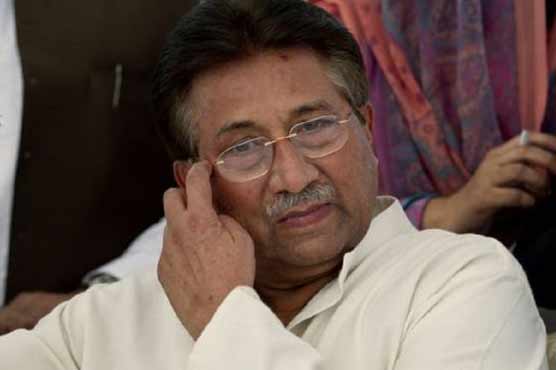Pervez Musharraf terms special court's verdict dubious

Musharraf said he is grateful to the army and the public for remembering his services.
DUBAI (Dunya News) – Former president General (retd) Pervez Musharraf termed the special court’s verdict dubious, saying that no precedent can be found for such a decision where neither the accused nor his lawyer were given the fundamental right to defend the case.
In a statement issued by Pervez Musharraf, he expressed: "I heard the special court’s decision on TV, and it was an indefinite verdict which deliberately targeted only one person in the proceedings”.
He said that he greatly respects the Pakistani judiciary, but this is the first time in history that a special court has given such a verdict. “I even offered to record a statement before the special commission, but my statement was ignored and not recorded”, he added.
Pervez Musharraf expressed that he was targeted by officials who hold high positions. He went on to say that the case was heard because of some personal outrage while those judges who benefitted in his tenure are misusing their position against him. “The choice of events according to their intentions shows what these people want,” he asserted , adding that he is grateful to the army and the public for remembering his services.
Former President awarded death sentence in high teason case
On Dec 17, special court in Islamabad has sentenced former president and top military official Pervez Musharraf to death in high treason case.
According to details, a three-member bench comprising Chief Justice of Peshawar High Court (PHC) Waqar Seth, Justice Nazar Akbar of Sindh High Court (SHC) and Justice Shahid Karim of Lahore High Court (LHC) has announced the verdict that was reserved on December 5.
During the hearing, Justice Seth said that ex-president has been found guilty of violating the Article 6 of the Constitution by clamping the state of emergency on November 3, 2007.
According to the High Treason (Punishment) Act, 1973, “any person who abrogates or subverts or suspends or hold in abeyance, or attempts or conspires to abrogate or subvert or suspend or hold in abeyance the Constitution by use of force or show force or by any other unconstitutional means shall be guilty of high treason.” The sentence for high treason is death or lifetime imprisonment.
The verdict was split 2-1 and a detailed verdict will be issued in 48 hours.
Pak Army expresses "pain and anguish" over the verdict
Inter-Services Public Relations (ISPR) Director General Major General Asif Ghafoor on Tuesday said that the special court verdict in the Pervez Musharraf treason case has been received with “alot of pain and anguish within the rank and file of Pakistan armed forces”.
The statement comes after sources said a meeting of the top military leadership was underway at the General Headquarters in Rawalpindi in the wake of the judgement.
The DG ISPR statement said that an ex-Army Chief, Chairman Joint Chief of Staff Committee and President of Pakistan, who has served the country for over 40 years, fought wars for the defense of the country can surely never be a traitor.
Treason case: Timeline
The ex-president was facing treason trial under Article 6 of the Constitution as well as Section 2 of the High Treason Act for imposing emergency in the country on November 3, 2007 that also resulted in the suspension of 61 judges of the superior judiciary, including then Chief Justice Iftikhar Mohammad Chaudhry.
On November 29, 2007, retired general Pervez Musharraf took oath as a civilian president and lifted the emergency, revoked the Provisional Constitutional Order (PCO) and restored a Constitution amended on November 15, 2007.
On August 18, 2008, Pervez Musharraf resigned as president after a nine-year rule in the country. On July 22, 2009, Supreme Court had summoned him to defend his action regarding emergence while on July 31, 2009, the apex court had declared Musharraf‘s decision to impose an emergency and PCO as illegal and unconstitutional.
The ex-president refused to respond to the court and departed for United Kingdom after which, his companions launched a political party "All Pakistan Muslim League (APML)" and made him its chairman.
On March 23, 2013, Musharraf returned Pakistan on pre-homecoming protective bail for 10 days to participate in the general elections.
On April 8, 2013, SC had summoned ex-military ruler in the treason case and directed the interior ministry to include his name in the Exit Control List (ECL). On November 18, 2013, then Chief Justice of Pakistan Iftikhar Chaudhry had established special court for the trial of Musharraf. However, on December 12, 2013, the tribunal called him for proceedings of treason case.
On March 30, 2014, the special court had indicted former president but on March 18, 2016, he left for Dubai to “seek medical treatment”. On May 11, 2016, special court had declared Musharraf an absconder as he did not return after getting bail in the treason case.
On June 7, 2018, SC had allowed Musharraf to contest elections on the condition to appear before the court but on August 29, 2018, the special court was told that Interpol had refused to issue red warrants for ex-president’s repatriation from UAE.
On October 8, 2019, special court had decided to hear the case on the daily basis.
On November 19, 2019, the court had concluded the case and reserved the verdict for announcement on November 28 but on November 23, 2019, Musharraf challenged special court‘s move in Lahore High Court while a plea from interior ministry was also filed in Islamabad High Court (IHC).
Chief Justice Athar Manallah stated that there were unique, unusual and unprecedented circumstances in the case.
Moreover, the special court said that it will announce the verdict of high treason case against Pervez Musharraf on December 17.

